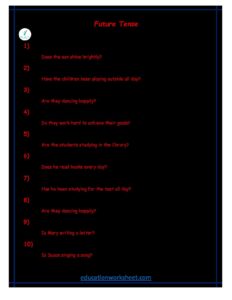how to converting Perfect Tense negative sentences to interrogative form
how to converting Perfect Tense negative sentences to interrogative form
Table of Contents
- Introduction
- Understanding Perfect Tense
- The Importance of Transformation
- The Purpose of Interrogative Sentences
- Basic Structure of Perfect Tense Negative Sentences
- Present Perfect Negative
- Past Perfect Negative
- Future Perfect Negative
- Conversion Rules
- General Rule
- Question Words
- Subject-Verb Inversion
- Practice Exercises
- Present Perfect
- Past Perfect
- Future Perfect
- Common Mistakes to Avoid
- Misplaced Question Words
- Incorrect Verb Forms
- Subject-Verb Agreement
- Examples and Solutions
- Summary
1. Introduction
In English grammar, the perfect tense is used to convey actions or states that are completed or perfect in relation to a specific point in time. It is a crucial part of communication and allows us to express various meanings, such as experience, results, and expectations. When we want to transform negative sentences in the perfect tense into interrogative sentences, we need to follow specific rules to maintain the grammatical integrity of the sentence. This transformation is essential for engaging in conversations and seeking information.
Understanding Perfect Tense: Before diving into the transformation process, it’s essential to have a solid grasp of the perfect tenses. There are three main perfect tenses:
- Present Perfect: Used to describe actions that started in the past and have relevance to the present. It’s formed with “have” or “has” + the past participle of the verb (e.g., “I have eaten”).
- Past Perfect: Describes actions that were completed before another past action or a specific point in the past. It’s formed with “had” + the past participle of the verb (e.g., “I had finished”).
- Future Perfect: Indicates that an action will be completed at a specific point in the future. It’s formed with “will have” + the past participle of the verb (e.g., “I will have completed”).
The Importance of Transformation: Transforming negative sentences in the perfect tense to interrogative form is important for effective communication. It allows us to ask questions about past actions, experiences, or future expectations. It also helps in seeking information and engaging in conversations.
The Purpose of Interrogative Sentences: Interrogative sentences are used to ask questions, seek information, and elicit responses. By transforming negative sentences into interrogative form, you can inquire about events, experiences, and future plans. This serves as a valuable tool for communication in various contexts.
2. Basic Structure of Perfect Tense Negative Sentences

Before we proceed with the conversion rules, let’s review the basic structure of negative sentences in each perfect tense:
Present Perfect Negative:
- Subject + (have/has) + not + past participle of the verb.
- Example: “I have not visited Paris.”
Past Perfect Negative:
- Subject + had + not + past participle of the verb.
- Example: “She had not finished her book.”
Future Perfect Negative:
- Subject + will have + not + past participle of the verb.
- Example: “They will not have arrived by then.”
Understanding the negative structures is crucial before we convert them into interrogative sentences.
3. Conversion Rules
To convert perfect tense negative sentences into interrogative form, follow these general rules:
General Rule:
- Start with an appropriate question word (who, what, when, where, why, how) or an auxiliary verb (have, has, had, will have) based on the tense.
- Insert the subject of the sentence after the question word or auxiliary verb.
- Invert the subject and the auxiliary verb (subject-verb inversion).
- Add the past participle of the verb.
- Finish the sentence with a question mark.
Now, let’s break down the rules for each perfect tense:
Present Perfect Interrogative:
- Question Word (or Auxiliary Verb) + Subject + (have/has) + past participle +?
Example: “Have they visited Paris?”
Past Perfect Interrogative:
- Question Word (or Auxiliary Verb) + Subject + had + past participle +?
Example: “Had she finished her book?”
Future Perfect Interrogative:
- Question Word (or Auxiliary Verb) + Subject + will have + past participle +?
Example: “Will they have arrived by then?”
Question Words:
- Question words (who, what, when, where, why, how) are often used to form interrogative sentences. These words determine the type of information you are seeking.
Subject-Verb Inversion:
- In interrogative sentences, the subject and auxiliary verb are inverted, meaning they switch places compared to the word order in declarative sentences. This inversion is a key feature of interrogative sentences in English.
how to converting Perfect Tense negative sentences to interrogative form

4. Practice Exercises
Now, let’s practice transforming negative sentences in each perfect tense into interrogative form.
Present Perfect:
Negative: “I have not visited Paris.” Interrogative:
Past Perfect:
Negative: “She had not finished her book.” Interrogative:
Future Perfect:
Negative: “They will not have arrived by then.” Interrogative:
(Answers provided later in the “Examples and Solutions” section.)
5. Common Mistakes to Avoid
When converting perfect tense negative sentences into interrogative form, there are some common mistakes to be aware of:
Misplaced Question Words:
- Be cautious not to misplace the question word. It should come at the beginning of the sentence, before the subject and the auxiliary verb.
Incorrect: “Visited they Paris?” Correct: “Have they visited Paris?”
Incorrect Verb Forms:
- Ensure that you use the correct auxiliary verb for the tense. For example, use “have” for present perfect, “had” for past perfect, and “will have” for future perfect.
Incorrect: “Will they finished their work?” Correct: “Had they finished their work?”
Subject-Verb Agreement:
- Maintain subject-verb agreement when inverting the subject and the auxiliary verb.
Incorrect: “Have she visited Paris?” Correct: “Has she visited Paris?”
how to converting Perfect Tense negative sentences to interrogative form

6. Examples and Solutions
Now, let’s look at the practice exercises and their solutions:
Present Perfect:
Negative: “I have not visited Paris.” Interrogative: “Have I visited Paris?”
Past Perfect:
Negative: “She had not finished her book.” Interrogative: “Had she finished her book?”
Future Perfect:
Negative: “They will not have arrived by then.” Interrogative: “Will they have arrived by then?”
These examples illustrate the conversion process for each perfect tense. By following the rules and practicing, you can confidently transform negative sentences into interrogative form.

